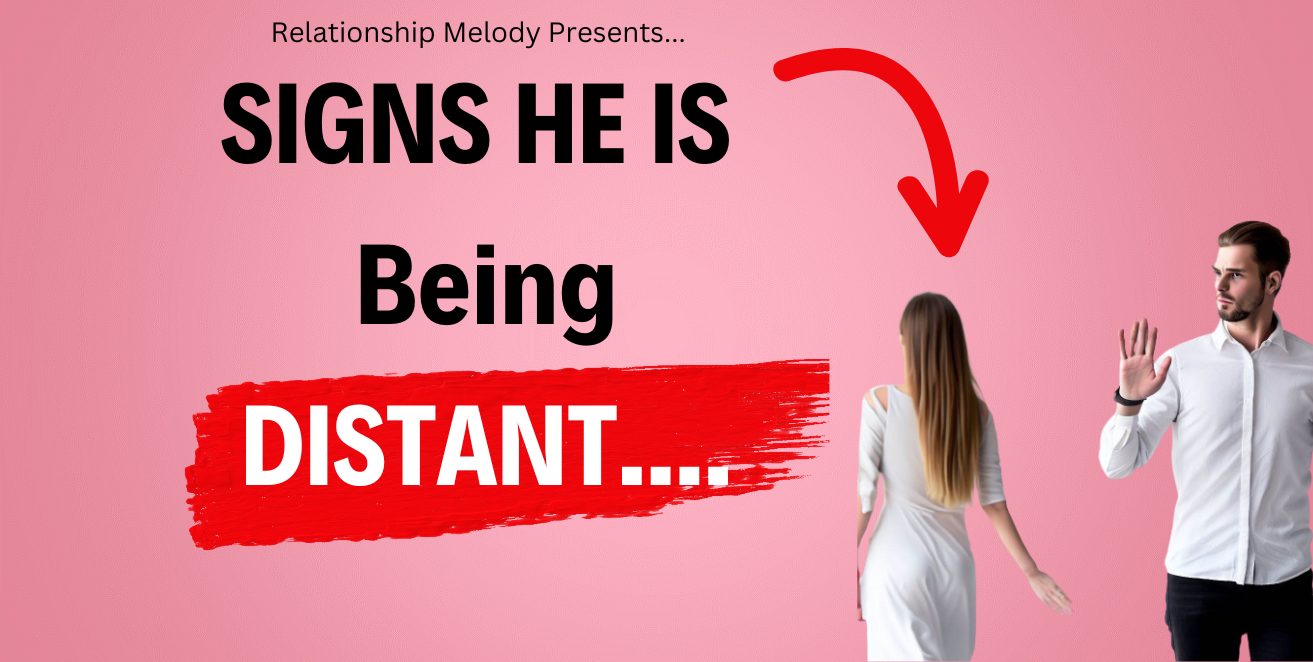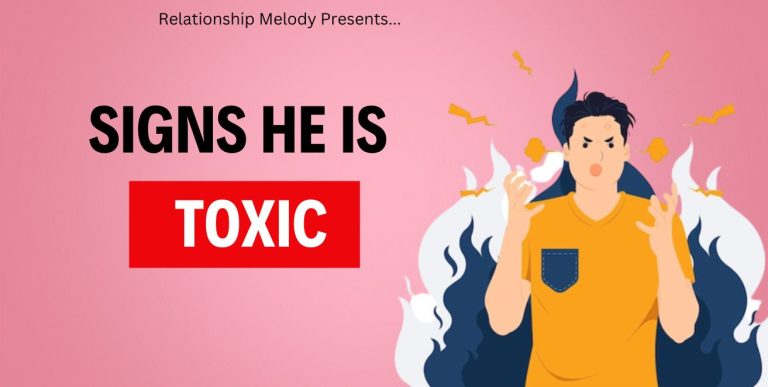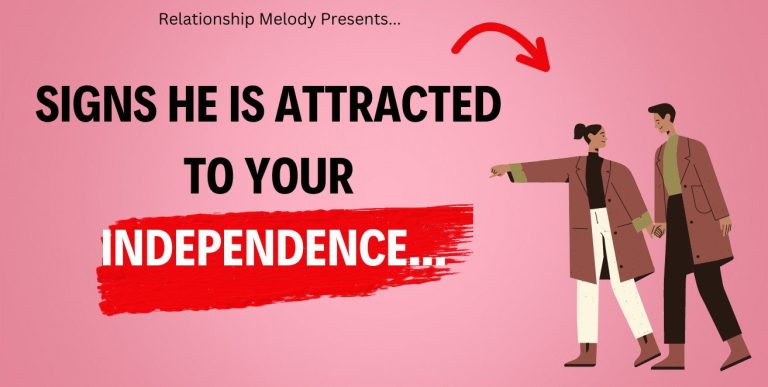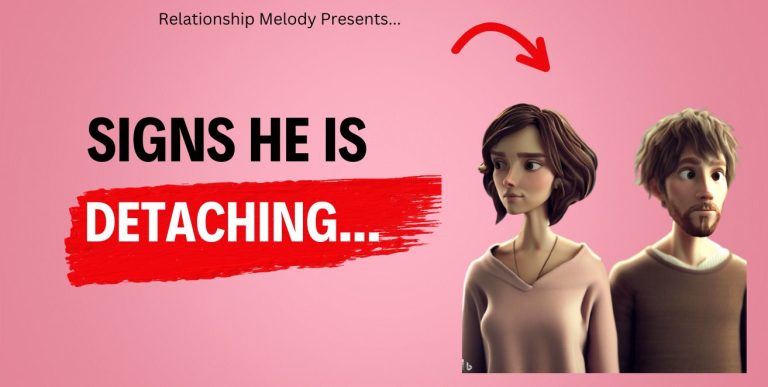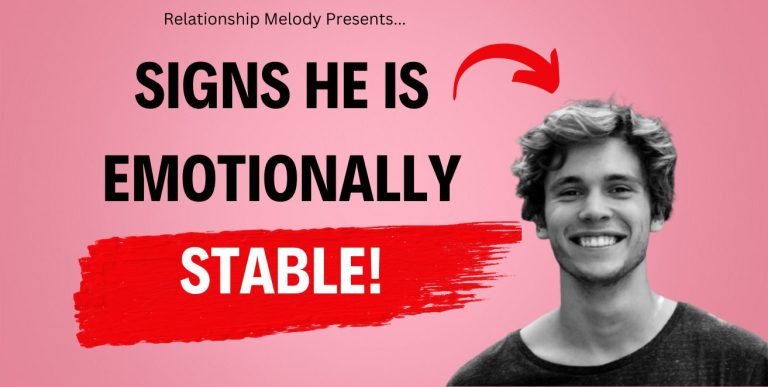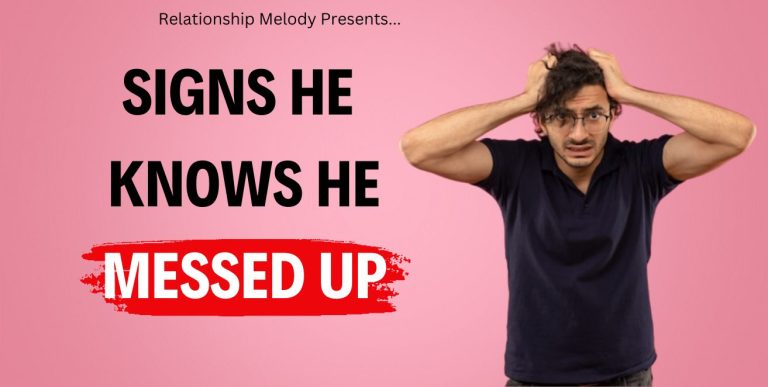25 Signs He Is Being Distant
Relationships can be a beautiful journey filled with love, support, and understanding. However, there are times when one partner may start to exhibit signs of emotional distance, leaving the other feeling confused and insecure.
If you’ve been experiencing such behaviour from your partner, it’s crucial to identify the signs of emotional withdrawal and understand what they might mean for your relationship.
In this blog post, we will explore 25 common signs that indicate he is being distant, helping you gain clarity and navigate this challenging phase.
25 Signs He Is Being Distant
These are 25 Signs to know.
Sign#1: Decreased Communication
One of the prominent signs that he is being distant is a noticeable decline in communication. If your partner’s response time has significantly slowed down or their messages lack their usual warmth and enthusiasm, it could be a red flag.
Communication is the backbone of any relationship, and when it starts to dwindle, it indicates a growing emotional distance between partners.
It’s essential to pay attention to these changes and initiate open and honest conversations to understand the reasons behind the decreased communication.
Sign#2: Cancelled Plans
Frequent cancellations and unexplained schedule changes might indicate that he is avoiding spending time together.
When someone becomes distant, they often find excuses to avoid intimacy and emotional connection.
Cancelled plans can leave you feeling disappointed and unimportant. It’s important to address this behaviour and express your feelings.
Understanding the underlying reasons behind the cancellations is crucial for determining if the relationship can overcome this hurdle.
Sign#3: Lack of Intimacy
Intimacy encompasses both physical and emotional closeness. If you notice a decline in physical affection, such as fewer hugs, kisses, and expressions of love, it may indicate emotional withdrawal.
Additionally, there might be a lack of emotional intimacy, where he is no longer sharing his thoughts, feelings, and vulnerabilities with you.
The absence of intimacy can lead to feelings of disconnection and loneliness. It’s vital to have open conversations about your needs and desires for intimacy and to listen to your partner’s perspective.
Sign#4: Disinterest in Your Life
A partner who is emotionally distant may show little to no interest in your daily experiences, dreams, and aspirations.
They may seem disengaged when you share details about your life, which can make you feel unheard and unimportant.
It’s crucial to communicate your feelings and discuss the importance of mutual engagement and support in a relationship.
Understanding each other’s needs for emotional involvement is key to addressing this sign of emotional distance.
Sign#5: Constant Criticism
When someone becomes distant, they may resort to constant criticism as a way to create emotional distance.
An increase in critical remarks and a tendency to nitpick trivial matters can significantly impact your self-esteem and overall relationship satisfaction.
It’s essential to establish boundaries and communicate your feelings about the criticism. Healthy communication and constructive feedback are necessary for a thriving relationship.
Sign#6: Increased Defensiveness
When someone is being distant, they may become overly defensive and react negatively to any discussions about their behaviour.
They might avoid taking responsibility for their actions and deflect blame onto others. This defensiveness prevents open and honest communication, making it challenging to address the underlying issues.
It’s important to approach such conversations with empathy and patience, encouraging your partner to express their feelings and concerns without fear of judgment.
Sign#7: Absence of Future Planning
A lack of interest or reluctance to discuss and make plans for the future together is a significant sign of emotional distance.
When someone is emotionally engaged in a relationship, they typically invest in creating a shared vision for the future.
However, if your partner avoids discussions about the future or seems indifferent, it may indicate a lack of commitment or a desire to maintain emotional distance.
It’s crucial to have open conversations about your long-term goals and assess whether your partner is willing to work towards a shared future.
Sign#8: Lack of Support
Emotional distance often leads to a decline in support from your partner. If he is no longer there for you during challenging times or dismisses your problems, it demonstrates a lack of emotional investment.
Support and understanding are essential components of a healthy relationship. It’s important to communicate your need for support and discuss how you can navigate difficult situations together.
If your partner consistently fails to provide the support you require, it may be a sign of deeper issues within the relationship.
Sign#9: Avoidance of Eye Contact
Eye contact is a powerful non-verbal form of connection. If your partner frequently avoids eye contact during conversations or maintains a distracted gaze, it implies emotional disengagement. Eye contact fosters intimacy and communicates active listening and attentiveness.
When eye contact diminishes, it becomes challenging to establish a deep emotional connection. It’s crucial to address this sign and express your need for genuine eye contact to foster emotional closeness.
Sign#10: Decreased Physical Presence
If you notice that your partner is spending less time with you and finding excuses to be away more often, it could signify emotional withdrawal.
Physical presence is an important aspect of a relationship as it allows for quality time, shared experiences, and emotional bonding.
When your partner consistently chooses to be physically absent, it may indicate a desire to create distance.
Open communication about your needs for quality time and the reasons behind their decreased presence is crucial to understanding the dynamics at play.
Sign#11: Stonewalling
Stonewalling is a behaviour where your partner shuts down during disagreements or difficult conversations and refuses to communicate or find resolutions.
It is a clear indication of emotional withdrawal and a significant barrier to healthy communication.
When stonewalling becomes a pattern, it can lead to frustration, resentment, and a breakdown of trust in the relationship.
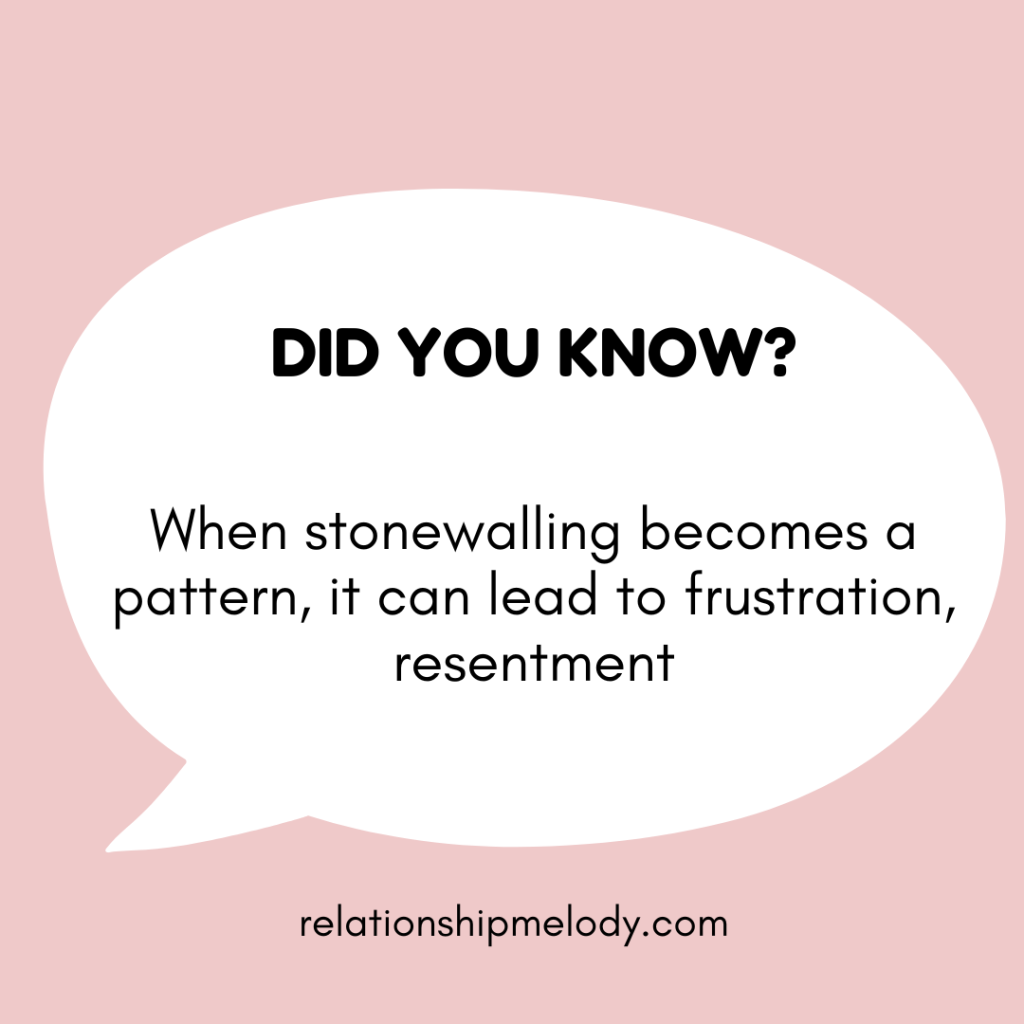
It’s crucial to address this behaviour and find ways to create a safe space for open and honest communication, where both partners feel heard and validated.
Sign#12: Emotional Unavailability
Emotional unavailability is characterized by a lack of emotional responsiveness. Your partner may show little to no empathy, understanding, or concern for your emotional well-being.
They may avoid discussing deeper emotions or dismiss your feelings altogether. Emotional unavailability hinders emotional connection and can leave you feeling isolated and unimportant.
It’s important to express your needs for emotional support and evaluate whether your partner is willing and capable of meeting them.
Sign#13: Increased Secretiveness
When someone is being distant, they may become more secretive about their whereabouts, activities, or personal life.
They may be reluctant to share information or be evasive when questioned. Increased secretiveness can erode trust and create a sense of suspicion within the relationship.
It’s important to communicate your concerns and establish open and honest communication channels. Building trust requires transparency and a willingness to share and be vulnerable with each other.
Sign#14: Lack of Initiation
If your partner no longer takes the initiative to plan dates, outings, or quality time together, it suggests a decline in interest and emotional investment.
Lack of initiation can create a one-sided dynamic, where you feel like you’re the only one putting effort into the relationship.
It’s important to communicate your desire for shared responsibility and active participation in nurturing the relationship.
Understanding each other’s expectations and finding a balance that works for both partners is crucial.
Sign#15: Reduced Physical Affection
A noticeable decrease in physical displays of affection, such as holding hands, cuddling, or intimate moments, can be a sign of emotional distance.
Physical affection is a way to express love, connection, and desire within a relationship. When it diminishes, it can leave you feeling unloved and disconnected.
It’s important to discuss your needs and desires for physical intimacy and explore ways to reignite the spark in your relationship.
Sign#16: Unexplained Mood Swings
If your partner experiences frequent mood changes without a clear cause, it could be a manifestation of emotional turmoil and withdrawal.
These unpredictable shifts in mood can create a tense and unpredictable atmosphere within the relationship. It becomes challenging to establish emotional stability and connection when your partner’s emotions are constantly fluctuating.
It’s important to encourage open communication about their feelings and explore any underlying issues that may be contributing to their mood swings.
Sign#17: Decreased Emotional Sharing
When emotional distance sets in, your partner may become reluctant to share their thoughts, feelings, and vulnerabilities with you.
They may withdraw from engaging in deep conversations or avoid discussing personal matters. This lack of emotional sharing can create a sense of disconnection and hinder the growth of intimacy within the relationship.
It’s crucial to create a safe space where both partners feel comfortable expressing their emotions and encourage open dialogue about each other’s experiences.
Sign#18: Engaging Less in Conversations:
If your partner responds with short answers, seems disinterested, or doesn’t actively engage in conversations, it may indicate emotional detachment.
Engaging in meaningful conversations is a way to connect and deepen understanding between partners.
When conversation becomes superficial or one-sided, it can lead to feelings of frustration and loneliness.
It’s important to address this issue by expressing your desire for more engaging communication and finding ways to foster active participation from both sides.
Sign#19: Increased Focus on Hobbies or Work
Escaping into hobbies or working excessively can be a sign of emotional distancing. Your partner may prioritize these activities over spending quality time together or addressing relationship issues.
It’s crucial to discuss the balance between personal interests and the needs of the relationship.
Finding common ground and shared activities can help reignite the connection and bridge the emotional gap that has formed.
Sign#20: Disengagement from Social Circle
When someone becomes emotionally distant, they may pull away from shared friends and avoid social gatherings.
They may no longer show interest in participating in social activities or engaging with your mutual circle.
This disengagement can lead to a sense of isolation and further deepens the emotional distance.
It’s important to encourage open communication about social needs and expectations and to find a balance that allows both partners to maintain their individuality while also nurturing the social aspects of the relationship.
Sign#21: Lack of Compromise
When someone is emotionally distant, they may exhibit a lack of willingness to meet halfway or compromise on important matters within the relationship.
They may prioritize their own needs and desires without considering the impact on the partnership.
This lack of compromise can create a power imbalance and lead to feelings of resentment and dissatisfaction.
It’s important to have open discussions about the importance of compromise and finding mutually beneficial solutions that honour both partners’ needs and aspirations.
Sign#22: Emotional Inconsistency
Emotional inconsistency is characterized by erratic behaviour, switching between affection and aloofness.
One moment, your partner may exhibit warmth and closeness, and the next, they may withdraw and become emotionally distant.
This inconsistency can be confusing and create emotional instability within the relationship. It’s essential to communicate your feelings about this pattern and seek an understanding of the underlying reasons behind the emotional fluctuations.
Sign#23: Excessive Criticism of the Relationship
When someone is emotionally distant, they may excessively question the viability of the relationship or express doubts about its future.
They may focus on the negatives and criticize the relationship without offering constructive solutions. This constant criticism can create a toxic environment and erode the foundation of trust and security.
It’s important to address this behaviour and engage in open, non-defensive conversations to understand their concerns and explore ways to improve the relationship dynamics.
Sign#24: Increased Irritability
If your partner becomes easily irritable or impatient with you, it may indicate emotional distance. They may exhibit a short temper, snap at you over minor issues, or display a general lack of tolerance.
Increased irritability often stems from underlying emotional turmoil or a desire to create distance.
It’s important to address this behaviour by expressing your observations and concerns and creating a safe space for open dialogue to understand the triggers and find healthier ways to communicate frustrations.
Sign#25: Expressing a Desire for Space
When someone is being emotionally distant, they may openly express a desire for space or alone time. They may request more independence and distance themselves physically and emotionally.
While space can be healthy and necessary at times, excessive or prolonged distancing can signal deeper issues within the relationship.
It’s crucial to have open discussions about the balance between personal space and maintaining emotional connection.
Establishing boundaries and finding ways to reconnect during the times spent together becomes vital for the health of the relationship.
Read more about the Signs He Is Being Unfaithful
Conclusion:
Recognizing the signs of emotional distance is essential for maintaining a healthy and fulfilling relationship.
While these signs can be worrisome, it’s crucial to approach the situation with empathy and open communication.
If you notice several of these signs in your relationship, it may be time to have an honest conversation with your partner about your concerns.
Remember, understanding the underlying reasons for his emotional withdrawal can provide insight into the next steps you need to take to either rebuild the connection or reassess the relationship’s compatibility.
Ultimately, every relationship requires effort, understanding, and mutual support to thrive.
Liked Our Article? Feel Free To Support Us
Our Patreon Page: https://www.patreon.com/RelationshipMelody

Welcome to Relationship Melody! Our website is dedicated to all things on relationships, dating, and love! We are passionate about helping you navigate the ups and downs of love, and our goal is to provide you with valuable insights and information that will make your journey toward a fulfilling relationship smoother and more enjoyable.

